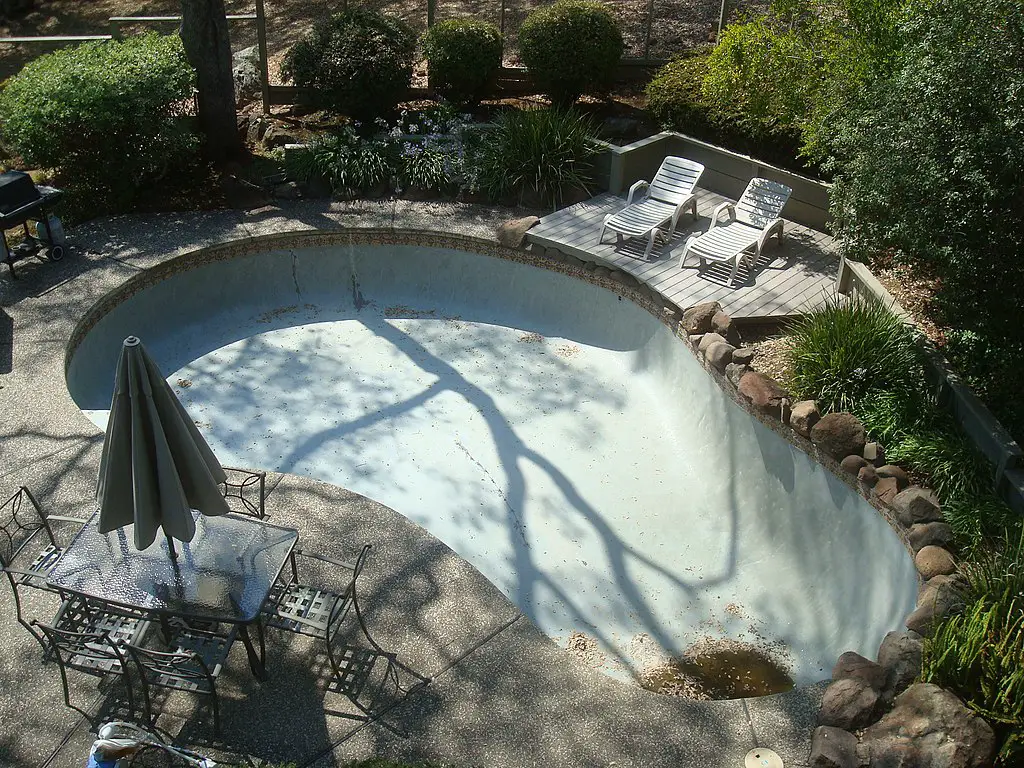If you are still a relatively new pool owner, you may have read during your research or heard from talking to other pool owners that you should almost never drain your pool.
Even if your pool is overflowing due to the rainy season or even if your pool looks like a swamp due to algae growth, these are still not good enough reasons to drain your pool. For the former problem, you can partially drain your pool if it’s full. For the latter problem, you can add chemicals to your dirty pool water to sanitize it. The solution is almost never to drain your pool.
Why is it so important not to drain your pool? Because if you do, your pool is at risk of experiencing structural damage. The plaster can crack, the pool shell can pop out of the earth, and the pool walls could collapse just to list a few problems.
In this article, I will go over the problems that are likely to happen if you were to drain your pool and why these issues occur.
Why shouldn’t you drain your swimming pool?
It can cause structural damage
Draining your pool can cause structural damage to the pool shell/frame, and this is true of both above-ground pools and inground pools.
For above-ground pools, draining the water can cause the liner to shrink, which can then tear when refilling the pool. The older the liner, the greater the chances of it tearing because it is not as stretchy anymore. Many experts recommend only draining an above-ground pool if your goal is to replace the liner.
For an inground vinyl liner pool, this is the most dangerous pool to drain and should only be done by a professional. This type of inground pool is designed to only remain structurally sound when there is water inside the liner holding back the weight of the soil surrounding it. Draining this type of pool will cause the walls to collapse under the weight of the earth.
Even inground concrete pools and fiberglass pools should not be left empty. The plaster will dry up and crack, and an even bigger problem can occur which the next section covers.
The pool shell can pop out
Think of the shell of your inground pool as a boat. If water manages to reach underneath it, it can easily float. When your pool is filled, the weight of the water keeps the pool shell in place.
When you drain your pool and there is nothing counteracting the hydrostatic pressure of the groundwater in your yard, your pool shell can literally pop out.
If you happen to have a deck installed around your pool, having the shell pop out can cause immense structural damage to your deck.
“Pool popping” is a real term in the pool service and repair industry, if that gives you any indication of how often it happens.
It’s a waste of water
Structural damage aside, there are a few other downsides to draining your pool. One of which is, obviously, that you will need to replace the water and that costs time and money.
If your pool water looks and smells like a literal swamp, you might think there is no other choice. However, you would be amazed at how effective shocking your pool, vacuuming, and filtering the water is. By adding sanitizing chemicals into your pool, you could turn an algae-infested pool back into the crystal clear pool you once had.
I guarantee that this is the cheaper and less headache-inducing option than draining and replacing the water, especially since you could cause structural damage to your pool while it’s empty.
It can kill your grass
When you drain your pool water, much of it will seep into the surrounding soil. You might think, great, then at least the vegetation in my yard gets to have a refreshing drink.
Except, your pool water contains chemicals that will kill your grass. Also, the sheer amount of water released can drown your grass and plants and cause the pool shell to pop out.
The “safe” option would be to dilute the pool water by mixing it with fresh water before watering your grass and plants, but this would take forever to drain your pool.
And in the meantime, your pool could start experiencing structural damage and be at risk of collapsing, so this is not a viable option either.
Is there a way to safely drain my pool without it collapsing?
Yes, but it must not be done by you. Many pool owners are surprised to learn that they should basically never drain their pool for the reasons listed above.
Above-ground pools can be drained for the purpose of replacing the liner because it doesn’t matter if the old liner gets damaged during the process; it was getting replaced anyways.
Typically, inground pools do not need to be drained. The main reasons why a pool should ever get drained is if it requires repairs that can only be performed if the pool is drained, or if you need to stabilize the Total Dissolved Solids (TDI).
Almost every other issue can be resolved without draining the pool, or at worst partially draining the pool. And again, if you need to drain the pool, you wouldn’t do it yourself – you’d hire a professional to do it for you.
Taking matters into your own hands could result in the pool popping out, the walls bulging out or collapsing, your grass and plants dying from the water seeping into the ground, an expensive water bill, and possibly other costly repairs related to fixing structural damage in and around your pool.
Photo Credit: Andy “AJ” Jennings, CC BY-SA 3.0

